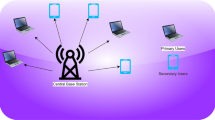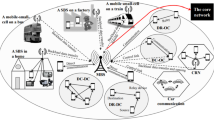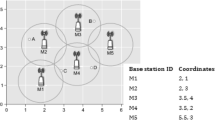Abstract
Delay tolerant networks (DTNs) experience frequent and long lasting network disconnection due to various reasons such as mobility, power management, and scheduling. One primary concern in DTNs is to route messages to keep the end-to-end delivery delay as low as possible. In this paper, we study the single-copy message routing problem and propose an optimal opportunistic routing strategy – Leapfrog Routing – for probabilistically contacted DTNs where nodes encounter or contact in some fixed probabilities. We deduce the iterative computation formulate of minimum expected opportunistic delivery delay from each node to the destination, and discover that under the optimal opportunistic routing strategy, messages would be delivered from high-delay node to low-delay node in the leapfrog manner. Rigorous theoretical analysis shows that such a routing strategy is exactly the optimal among all possible ones. Moreover, we apply the idea of Reverse Dijkstra algorithm to design an algorithm. When a destination is given, this algorithm can determine for each node the routing selection function under the Leapfrog Routing strategy. The computation overhead of this algorithm is only O(n 2) where n is the number of nodes in the network. In addition, through extensive simulations based on real DTN traces, we demonstrate that our algorithm can significantly outperform the previous ones.
Similar content being viewed by others
References
Delay Tolerant Network Research Group. April 28, 2009, http://www.dtnrg.org/.
Burgess J, Gallagher B, Jensen D et al. MaxProp: Routing for vehicle-based disruption-tolerant networks. In Proc. IEEE INFOCOM 2006, Barcelona, Spain, April 23–29, 2006, pp.1–11.
Burns B, Brock O, Levine B N. MV routing and capacity building in disruption tolerant networks. In Proc. IEEE IN-FOCOM 2005, Miami, USA, March 13–17, 2005, pp.398–408.
Conan V, Leguay J, Friedman T. Fixed point opportunistic routing in delay tolerant networks. IEEE Journal on Selected Areas in Communications, 2008, 26(5): 773–782.
Hui P, Crowcroft C, Yoneki E. BUBBLE rap: Social-based forwarding in delay tolerant networks. In Proc. ACM MobiHoc 2008, Hong Kong, China, May 27{30, 2008, pp.241–250.
Jain S, Fall K, Patra R. Routing in a delay tolerant network. In Proc. ACM SIGCOMM 2004, Portland, USA, August 30–September 3, 2004, pp.145–158.
Jeremie L, Timur F, Vania C. Evaluating mobility pattern space routing for DTNs. In Proc. IEEE INFOCOM 2006, Barcelona, Spain, April 23–29, 2006, pp.1–10.
Lindgren A, Doria A, Schelen O. Probabilistic routing in intermittently connected networks. Lecture Notes in Computer Science, 2004, 3126(1): 239–254.
Cong Liu, Jie Wu. Routing in a cyclic MobiSpace. In Proc. ACM MobiHoc 2008, Hong Kong, China, May 27–30, 2008, pp.351–360.
Spyropoulos T, Psounis K, Raghavendra C. Spray and Wait: An efficient routing scheme for intermittently connected mobile networks. In Proc. ACM SIGCOMM Workshop on Delay-Tolerant Networking (WDTN) 2005, Philadelphia, USA, August 22–26, 2005, pp.252–259.
Vahdate A, Becker D. Epidemic routing for partially-connected ad hoc networks. Technical Report CS-2000-06, Duke University, June 2000.
Balazinska M, Castro P. Characterizing mobility and network usage in a corporate wireless local-area network. In Proc. ACM MobiSys 2003, San Francisco, USA, May 5–8, 2003, pp.303–316.
Henderson T, Kotz D, Abyzov I. The changing usage of a mature campus-wide wireless network. In Proc. ACM MobiCom 2004, Philadelphia, USA, September 26–October 1, 2004, pp.187–201.
CRAWDAD data set. April 28, 2009, http://crawdad.cs.dartmouth.edu/.
Srinivasan V, Motani M, Ooi W T. Analysis and implications of student contact patterns derived from campus schedules. In Proc. ACM MobiCom 2006, Los Angeles, USA, September 24–29, 2006, pp.86–97.
Tariq M M B, Ammar M, Zegura E. Message ferry route design for sparse ad hoc networks with mobile nodes. In Proc. ACM MobiHoc 2006, Florence, Italy, May 22–26, 2006, pp.37–48.
Zhao W, Ammar M, Zegura E. A message ferrying approach for data delivery in sparse mobile ad hoc networks. In Proc. ACM MobiHoc 2004, Tokyo, Japan, May 24–26, 2004, pp.187–198.
Balasubramanian A, Levine B N, Venkataramani A. DTN routing as a resource allocation problem. In Proc. ACM SIGCOMM 2007, Kyoto, Japan, August 27–31, 2007, pp.373–384.
Author information
Authors and Affiliations
Corresponding author
Additional information
This work is supported by the National Basic Research 973 Program of China under Grant No. 2006CB303006, the National Natural Science Foundation of China under Grant No. 60803009, and the National Research Foundation for the Doctoral Program of Higher Education of China under Grant No. 20070358075.
Rights and permissions
About this article
Cite this article
Xiao, MJ., Huang, LS., Dong, QF. et al. Leapfrog: Optimal Opportunistic Routing in Probabilistically Contacted Delay Tolerant Networks. J. Comput. Sci. Technol. 24, 975–986 (2009). https://doi.org/10.1007/s11390-009-9272-x
Revised:
Published:
Issue Date:
DOI: https://doi.org/10.1007/s11390-009-9272-x




